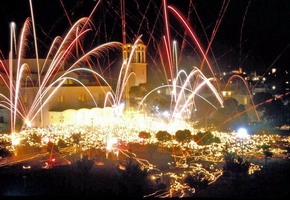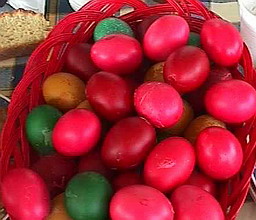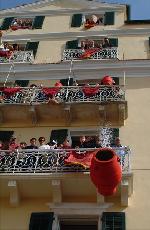GREEK EASTER
Embraced by all Greeks, Easter (Pascha) is the most celebrated feast in Greek culture. Rich in tradition and custom, it is the highlight of the religious calendar. As Orthodox Easter is based on the Julian calendar, Easter falls at a different time each year, and at a different time from the Easter period recognised by other Christian churches.
For Greeks Easter is symbolised not only in the celebrations of Easter Sunday. It involves a period of preparation over a number of important days.
Holy Week (Megali Evdomada) starts Monday April 6 , 2015
The week leading up to Easter is known as Holy Week (Megali Evdomada) and this is
when most people take their fasting seriously.
Church services are held throughout Holy Week.
Many tavernas close during this week, and the ones that stay open have mostly
seafood and vegetable dishes on their menu.
The women dye eggs red (symbolising the blood of Christ) and bake Easter biscuits
'koulourakia' and kalitsounia (cheese pies), to be eaten after Easter Saturday when
the fast ends.
It smells lilac on Good Friday – the day Christians commemorate the crucifixion of Jesus Christ and his death at Calvary. In Greek Orthodox churches, at 12 noon the body of Jesus is taken down from Crucifix and laid to the Tomb; symbolized by the flower-covered Epitafios. The bell is mourning every hour until the evening. At 9 pm the Epitafios procession begins with men carrying the Epitafios around the church neighborhood and the clergy and chorus chanting the most heart touching Lamentations – Praises for the Death of Jesus. The believers follow the procession with candles. In some areas, the Epitafios from several churches meet together. The most impressing Epitafios meeting takes place in Athens downtown in front of the Greek Parliament at Syntagma Square. Athens downtown is closed to traffic.
The Resurrection or Anastasis
 At 11pm on Saturday night pretty much the entire country is in church. The lights are turned off at midnight and the priest announces that Christ has arisen from the dead as candles are lit from his and then from each other. The tiny glow at the front of the church grows and soon the whole room is illuminated by the light of everyone's candles. At the stroke of midnight the priest intones the paschal hymn "Christ has risen from the dead and in so doing has trampled on death and to those in the tombs he has given life". The church bells ring in celebration, fireworks go off, ships sound their sirens and the light and sound makes the 4th of July seem tame in comparison. People greet each other happily with the words Christos Anesti (Christ has arisen) which is replied to with Alithos Anesti (Truly He has arisen). Then everyone heads for home with their lighted candles where they trace the cross three times above the door and to bless trees and farm animals. Most people either stay home or go to a restaurant for the traditional bowl of mageiritsa, a thick green soup made from the intestines of the lamb that will be roasted the next day, breaking their 40 day fast which began with the end of Apokreas. Gunshots, dynamite and fireworks will be going off for the next 24 hours or more shattering nerves and blowing off a finger or two.
At 11pm on Saturday night pretty much the entire country is in church. The lights are turned off at midnight and the priest announces that Christ has arisen from the dead as candles are lit from his and then from each other. The tiny glow at the front of the church grows and soon the whole room is illuminated by the light of everyone's candles. At the stroke of midnight the priest intones the paschal hymn "Christ has risen from the dead and in so doing has trampled on death and to those in the tombs he has given life". The church bells ring in celebration, fireworks go off, ships sound their sirens and the light and sound makes the 4th of July seem tame in comparison. People greet each other happily with the words Christos Anesti (Christ has arisen) which is replied to with Alithos Anesti (Truly He has arisen). Then everyone heads for home with their lighted candles where they trace the cross three times above the door and to bless trees and farm animals. Most people either stay home or go to a restaurant for the traditional bowl of mageiritsa, a thick green soup made from the intestines of the lamb that will be roasted the next day, breaking their 40 day fast which began with the end of Apokreas. Gunshots, dynamite and fireworks will be going off for the next 24 hours or more shattering nerves and blowing off a finger or two.
Easter Sunday
 Easter day is most people's favorite day of the year. A lamb is roasted and friends and families get together to eat, drink, talk and dance. In some towns like Arachova and Livadeia, it is a community celebration with rows of lambs roasting in the village square. In other towns like Monemvasia, Rhodes, Hydra, Halkidiki, Koroni, Chania and Leros the effigy of Judas or Barabbas is burned. In Syros and Karpathos people bring their guns and shoot Judas as a scapegoat for society's ills. In the town of Asine in the Argolid they actually have a street battle with the men of the upper and lower parts of the village hurling insults and fireworks at each other. In southern Messenia people go to the main squares to watch the saetapolemos, which are rockets without sticks that the men hold while the force of the explosions makes them jump as if they are dancing. This practice supposedly goes back to the War of Independence when people of the area fashioned this home-made bombs to scare the horses of the Turks to force their riders to dismount and lose their advantage. During the afternoon the red eggs are brought out and each person takes one and hits their end against someone else's until the last person who has an un-cracked egg is considered the lucky person for the year.
Easter day is most people's favorite day of the year. A lamb is roasted and friends and families get together to eat, drink, talk and dance. In some towns like Arachova and Livadeia, it is a community celebration with rows of lambs roasting in the village square. In other towns like Monemvasia, Rhodes, Hydra, Halkidiki, Koroni, Chania and Leros the effigy of Judas or Barabbas is burned. In Syros and Karpathos people bring their guns and shoot Judas as a scapegoat for society's ills. In the town of Asine in the Argolid they actually have a street battle with the men of the upper and lower parts of the village hurling insults and fireworks at each other. In southern Messenia people go to the main squares to watch the saetapolemos, which are rockets without sticks that the men hold while the force of the explosions makes them jump as if they are dancing. This practice supposedly goes back to the War of Independence when people of the area fashioned this home-made bombs to scare the horses of the Turks to force their riders to dismount and lose their advantage. During the afternoon the red eggs are brought out and each person takes one and hits their end against someone else's until the last person who has an un-cracked egg is considered the lucky person for the year.
IN CORFU
 At 11 o'clock just, the bells announce the "morning Resurrection", and Corfiot people throw ceramic pots off windows and balconies. This noisy habit possible bears the influence of the Venetians who would throw old objects out of their window on New Years Day, so than the New Year would bring them lots of new things. Another, more likely , explanation is that the custom is of pagan origins. By smashing things and making loud noises the Ancient Greeks wanted to wake up Persephone, the goddess of spring , and accelerate the coming of Spring .
At 11 o'clock just, the bells announce the "morning Resurrection", and Corfiot people throw ceramic pots off windows and balconies. This noisy habit possible bears the influence of the Venetians who would throw old objects out of their window on New Years Day, so than the New Year would bring them lots of new things. Another, more likely , explanation is that the custom is of pagan origins. By smashing things and making loud noises the Ancient Greeks wanted to wake up Persephone, the goddess of spring , and accelerate the coming of Spring .
The Philharmonic bands come back into the streets and they play joyful music.
At midnight all people go by thousands to the central squares of Corfu town and villages, to celebrate Resurrection with glory and typical customs.
Easter Vocabulary:
|
Πάσχα = Easter
Καλό Πάσχα = Happy Easter
Σαρακοστή = Easter Lent
Νηστεία = Fasting
Μεγάλη Εβδομάδα = Holy Week
Μεγάλη Πέμπτη = Holy Thursday
Μεγάλη Παρασκευή = Good Friday
Μεγάλο Σάββατο = Holy Saturday
Ανάσταση = Resurrection
|
Κερί = Candle
Αρνί = Lamb
Κόκκινα Αυγά = Red Eggs
Επιτάφιος = Epitaph, Bier
Άγιο Φώς = Holy Light
Εκκλησία = Church
Καλή Ανάσταση = Happy Resurrection
Χριστός Ανέστη=Christ is risen
|
|
|
Links: http://www.greecetravel.com/easter/
http://www.corfuvisit.net/
http://www.keeptalkinggreece.com/
|